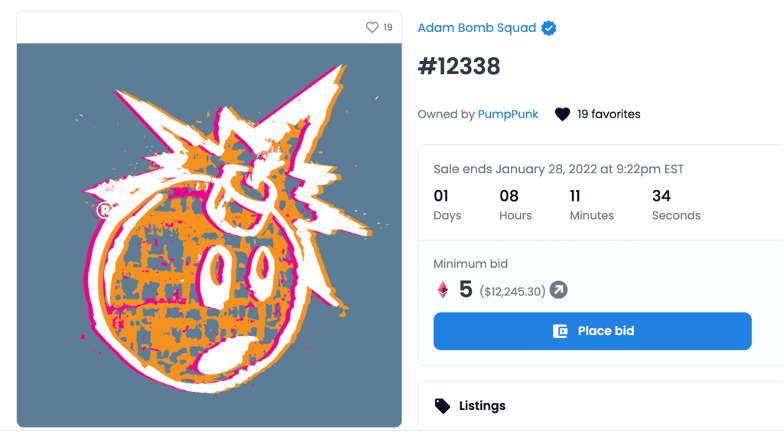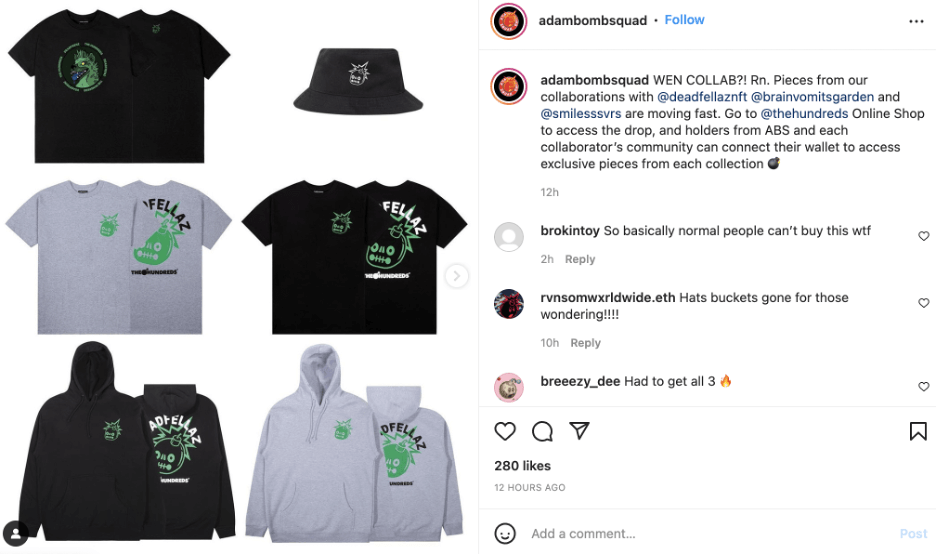
NFT-Community Engagement and Crypto Retail
A Rightpoint blog explored various aspects of the emerging Web3 and NFTs, and how these technologies may give rise to a new era of direct-to-consumer E-commerce. Since then, numerous enterprise-class brands have rolled out NFTs, from Coca-Cola, Anheuser Busch and McDonalds, to Mattel’s Hot Wheels, the NFL and Asics, and we thought now is a good time to see how the industry has progressed.


Investors can’t snap NFTs up fast enough. NFTs generated $27 billion in the first 10 months of 2021, 63% of which sold for $10,000 or more. Don’t worry about missing out -- 2022 looks equally promising for NFT launches.
What Makes for a Successful NFT?
Ask investors why they laid out $50,000 for an NFT and you’re likely to hear how cool it is to own a piece of digital art that is completely unique (and they have the smart contracts to prove that uniqueness). A coolness factor is important for the class of people who can afford such outlays, but what about the rest of us? Is cool a justification to jump in and buy one?
To a certain degree, NFTs are an emerging asset class, and some say they’re a good, safe investment. This past October, Coinbase announced plans to launch an NFT peer-to-peer marketplace that will make trading NFTs as easy as trading stocks via personal portfolio account. For savvy investors, NFTs offer the kind of arbitrage opportunities that are few and far between.
But in our mind, the true value of an NFT -- both for the minter and the buyer -- is the community engagement model that surrounds it, and the degree to which that community experience is meaningful and positive.
A number of these communities have well-documented and published roadmaps for delivering benefits. Owning an NFT isn’t simply a matter of possessing a unique piece of art, it offers privileges and entitlements within the community, perks that ultimately drive its future value.
Take, for instance, the NFT created by Bobby Hundreds. In the event you’re not familiar with him, Hundreds is a streetwear designer, culture visionary, and author of the book, This is Not a T-Shirt: A Brand, a Culture and A Community. He has built his business with the help of a community that continuously clamors for the next piece of art, the next creation. That’s his secret to success.
No one was surprised when Bobby Hundreds launched Adam Bomb Squad, which, according to its website is an “NFT project by The Hundreds, consisting of 25,000 unique combinations of bombs and accompanying backgrounds related to our history over the last two decades.” The cost of owning a bomb icon? As of this writing, minimum bids start at more than $12,000.

Should you buy one, your $12,245.30 will get you more than a unique piece of digital art. The Adam Bomb Squad NFT in your digital wallet gives you access to unique merchandise, such as Hundreds’ collaborations with other designers, including Deadfelles and Brain Vomit Garden.
Such merchandise, to the chagrin of people like @brokentoy, is off limits for “normal people,” which, in our opinion, illustrates the potential of NFTs as the ultimate community builder.

Poolsuite is another company we’ve followed through the years and has launched an NFT. Poolsuite started out as a media company, offering a Spotify-like music player on its website. Fans tuned in to listen to “ultra-summer” 80’s music that evoked virtual vacations. Soon enough, Poolsuite began selling merchandise under the brand name Vacation(R) which includes items such as t-shirts for $34, a Dayton Beach Plate (sold out) and a fondue set.
Poolsuite’s NFT offers exclusive access to IRL events, and promises to shower owners with “perks and gratitude commensurate with your status as a founding member.” Those perks include access to ambitious art projects, a bespoke version of the website, not-yet-designed merchandise, state-of-the-art financial instruments, and even owning part of a manor house to be built in an ideal vacation spot someday.
“By holding a Poolsuite brand NFT,” the brand enthuses, “you place your trust in us to deliver you an ongoing stream of experiences in the months and years ahead.”
Like the Adam Bomb Squad, the Poolsuite NFT is integrated with a digital wallet, and acts like a loyalty card. Flashing it provides access -- via a single sign on -- to exclusive merchandise and events.
Strong Signals That NFTs Have Legs
What's interesting with these blue chip NFTs -- Nike’s, the NFL’s, Bobby Hundreds’, Poolsuites -- is that these businesses were alive and well long before the NFT craze. These launches illustrate just how well these brands have been able to recontextualize their existing business models to new technological advancements.
And that, in turn, sends a strong signal about the state of the NFT market, and its ability to thrive and become as ubiquitous as E-commerce sites. The fundamentals of existing as a business -- attracting people who will buy stuff -- remain the same. These businesses don’t need an NFT to exist. What’s telling is that successful businesses are leveraging NFTs to push their product roadmap for community engagement, and we can only begin to imagine where those efforts may lead.
It helps that these NFT launches have largely worked as anticipated, which drives up the consumer’s expectations of the experiences. If Bobby Hundreds’ NFT launch had been rife with technical glitches it would have given his brand, and the NFT model, a black eye. As it happened, all went well and he successfully created a whole dimension, one in which customers can bounce between a physical and digital world seamlessly.
The ability to create a community that ties the online and offline world together is, in our opinion, one of the most exciting aspects of NFTs and Web3.
Why Rightpoint Is Excited About NFTs
We’re pretty stoked about NFTs because at their best, they mesh with what Rightpoint excels at, which is crafting the right experience for maximum engagement. So much of our work focuses on creating ecosystems that allow a brand to engage with its constituents seamlessly in new ways, and NFTs have the potential to take that to the next level.
That’s not to say all the kinks have been worked out. NFTs work on different coins (i.e. Bitcoin, Ethereum) and different blockchains, which effectively means brands and consumers will need to agree on a currency in order to do business. Crypto isn’t quite mature enough to work broadly across the economy, and quite a bit needs to be worked out before it’s mainstream.
How does the market help a Bobby Hundreds’ NFT flourish, not just the physical market, but in the digital one where you have a whole set of different rules in terms of transaction handling? If a commodity only accepts Bitcoin then consumers can play with it if their commodity of choice is Ethereum.
These issues are just tip of the iceberg. Once we have some kind of an exchange that allows for the free flow of currencies, there are other obstacles to address. For instance, how do we assess the volume of Bitcoin that’s out there and it’s actual value? Right now crypto is a bit of the Wild West. We’ll need an agreed upon set of valuations and transaction rules that make all people comfortable.
While the market works out those issues, Rightpoint has formed a Crypto Working Group within its Commerce practice to consider the implications of crypto, and how to meet our clients’ NFT and Web3 needs. We fully believe that commerce can be greatly enhanced with crypto retail and NFT-oriented community building, and we’re excited to be on this journey.


